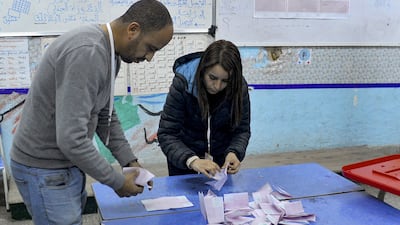Tunisia's Independent High Authority for Elections, whose members were appointed by President Kais Saied in May, said 803,638 of the 9,136,502 registered voters had cast their ballots by 6pm on Saturday, after the closure of ballot stations in a majority of constituencies.
This makes the official turnout rate, as announced by the electoral commission, 8.8 per cent across Tunisia.
“The electoral law does not mention a necessary threshold for the validation of these results so we will work with what we have,” Farouk Bouasker, president of ISIE, said in the last presser of the day at 7pm on Saturday.
Mr Bouasker claimed the low turnout rate was due to the absence of “corrupt political money” unlike previous elections, dubbing today’s vote as “pure and legitimate”.
Meanwhile, constituencies where there is only one candidate will have the winners announced automatically, said Tunisia’s High Electoral Authority member Mohamed Tlili Mnasser. This means that even the 400 votes rule that was required to make elections’ candidacies accepted will not be applied this time.
A second round of parliamentary elections will be required in places where the vote count shows a tie between two candidates or more.
Civil organisations observing the elections, such as Mourakiboun and Shahed Observatory, noted several electoral violations taking place such as the attempt of certain individuals to pay for people to vote or the interruption of the country's electoral silence rule.
Under Tunisia’s new electoral law, which was solely written by Tunisian president Kais Saied and later passed through a vaguely criticised referendum, set up a new system for elections where electors vote for individual candidates instead of party lists.
The new electoral system seems to be confusing for voters who showed up today. “I came here expecting to find different candidates as we are used to, but I only found one candidate that I do not know, so I cast a blank ballot instead,” one elderly man, who refused to identify himself, told The National after voting at the Rue d’Inde Elementary School ballot station.
Several local and international observers were present to monitor Tunisia’s elections of its future parliament, including African delegation Nouvelle Perspective and an official state delegation from Russia.
“Everything seems to be going well, we are used to observing elections in Tunisia here, the only difference we can see is that there aren’t many people participating” Louis Du Caca, member of Nouvelle Perspective African delegation, told The National at Rue de Marseille School ballot station.
Financial consultant Mohamed Sallemi said that he was obliged to cast a blank ballot due to the absence of competition in the Beb Bhar constituency, where he lives. He blamed the situation on "political inexperience”, but he remains hopeful and supportive of the president’s political project.
“I am one of the people who supported president Kais Saied decision on July 25 [2021], I know that there are certain challenges that we are facing at the moment, but I still believe that some of the people running for these elections can pump new blood into the legislative system and bring about the change we need,” Mr Sallemi told The National after casting his ballot.
Vote counts are expected to be finalised between December 18 and 20. However, the final results will be announced on January 19 after the conclusion of any appeal processes taken to Tunisia’s Administrative Court.


